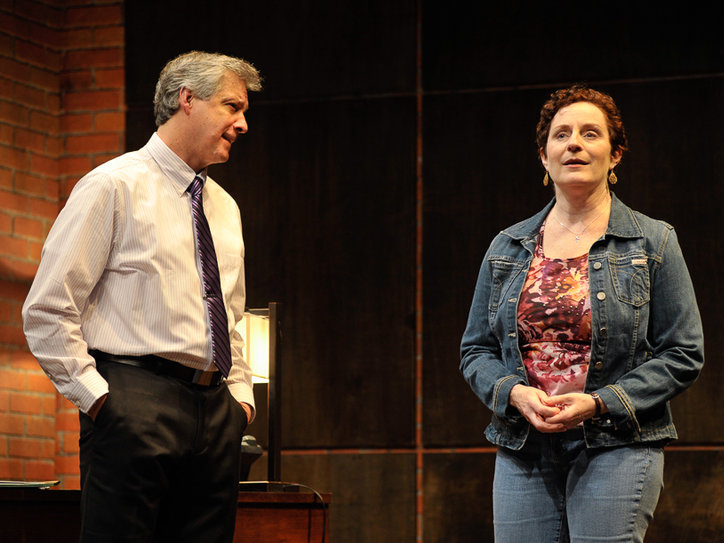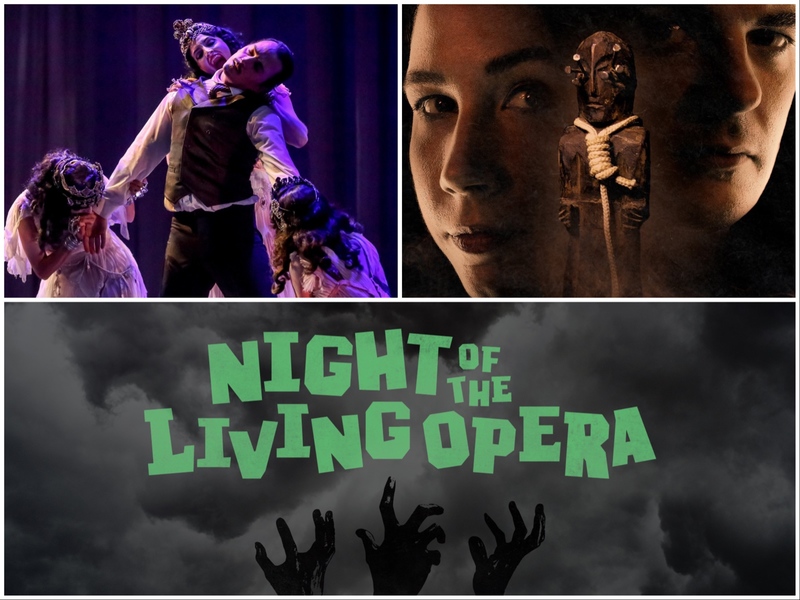After heading into the heart of the South in "The Beautiful Music All Around Us," the Milwaukee Rep now heads up to Southie in Boston, the home of Ben Affleck, the Red Sox, pahking the cahr in Hahvahd Yahd and David Lindsay-Abaire's "Good People."
The show premiered on Broadway in 2011, scoring strong reviews and a Tony Award for its lead actress, Frances McDormand. In the show, McDormand played Margie (pronounced with a hard G), a down-on-her-luck lifelong Southie resident who, in desperation, goes to meet with an old high school boyfriend, who moved out of the area and is now a wealthy doctor.
Taking over that role in the Rep's production is Milwaukee actress and director Laura Gordon, but it's not her first go around with Margie. The actress and the character know each other quite well back two years ago when Forward Theater in Madison put on the play and cast Gordon in the part. OnMilwaukee.com sat down with Gordon to talk about the show, revisiting Margie and learning that often imitated but rarely perfected Boston accent.
OnMilwaukee.com: What drew you to "Good People"?
Laura Gordon: I had an unbelievably great time doing it the first time. I just fell in love with this character. So then having the opportunity to do it again is just, like … I have to admit, when I heard the Rep was doing "Good People," I thought, "If they don’t hire me, I’m going to be really upset and going to cry." (laughs) It’s crazy because productions are being done all over the country, and I’m sure there are other actresses who’ve played Margie who feel the exact same way that I do, like I have some sort of ownership over it. I was feeling very proprietary. But I was so happy to get to do it again.
OMC: What is about the character of Margie that you really bonded to?
LG: When I was first offered the job in Madison, I was surprised that Jen Uphoff Gray, the artistic director there, thought of me because, to be perfectly honest, most of my career as an actress, I’ve played characters who’ve attended college. (laughs) Not that Margie is stupid, because she is not; she’s really smart, but she’s not educated. She dropped out of high school.
So I think part of my love of her and this play stems from the fact that it’s not the kind of role that I feel like I usually get the chance to play. And I felt, at my age – which is surprising – that I was doing something new. It felt like I had broken through something. Putting her on just felt good; it felt right.
I love how street smart she is. I love how much pluck she has, and how she’s been living this really challenging life, but she still maintains a sense of humor and tries to define herself as being a good person. I think that all the characters in the play you can make arguments that they’re all good people. I think they’re all flawed people; they make stupid decisions and stupid mistakes, but I think that their motives and Margie’s motives are pure.
It’s just a blast to play her, and I’d never played a character from South Boston, so learning that dialect was incredibly helpful to find her for me.
OMC: How did you hone and train that accent, because it seems people either get it right or completely massacre it?
LG: It’s really tricky. There was a lot of coaching and research and listening, watching a lot of movies set in Boston and just trying to get your ears tuned to it. This time, in October, I also went to Boston for a weekend with Tami Workentin, who plays Jean in the play. We did a weekend, and it was great. We went to Southie and visited all of the places that are referenced, getting a sense of the neighborhood. We hung out in a bar on a Sunday during a Patriots game with the locals.
OMC: What was that experience like?
LG: It was just so much fun. We were just kind of like eavesdropping, just enjoying the game and having a beer. It was research with beer. (laughs)
When I worked on the play before, I obviously researched and looked at a lot of pictures and saw the neighborhood, but I wanted to get there. It just makes a huge difference. When you have a line in the play like, "You ever get back there at all? Walk the Sugar Bowl, get a clam roll at Sully’s?" Well, I walked the Sugar Bowl and got a clam roll at Sully’s! It just makes it so much more potent.
OMC: For the accent, was there one particular accent or recording or performance that you really honed in on?
LG: There’s all kinds of sample stuff that you can get. The way it usually works is that the dialect and vocal coach will have some materials. Some are just kind of worksheets of drilling certain sounds. The thing that’s the most useful, though, is to actually listen to audio clips of native speakers. I did a bit of that, and obviously with the computer, there’s so much stuff out there.
It’s fun. I really like it and then I start to annoy my husband. The other day, we were cleaning some boxes, and I said, "Oh, you got more cahdboard from the cahr." And he’s like, "It’s pronounced car!" (laughs)
OMC: Returning to a character, did you kind of approach her with a new vision this time, or did you find something new in the character?
LG: I feel like I had a fair amount of success with her the first time. I feel like I kind of found who she was, so it didn’t feel right to say, "Well let’s scrap all of that." (laughs) It’s been a couple of years, so it’s not like it was super fresh in my head, but it was sort of like putting on this comfortable sweater again.
The lines are a bear. They are the toughest lines I’ve ever had to learn. It’s huge; the quantity is huge, and the first time I had to learn the script, I just drilled. I would get up at six in the morning, and I would work for four hours before coming to rehearsal. I am happy to report that it was not as grueling this time. (laughs)
It still required a lot of effort, but they came back more quickly than I thought they would. It just means I’m able to be in rehearsal and be more present in the moment of playing instead of trying to dredge lines up. There are points in rehearsal where you know the objective the actor is playing at that moment is remembering what their lines are. So that’s been a real blessing, not having to spend that much rehearsal time just trying to call up words. I feel like I’m learning more about her, just getting to live with her longer.
This is also a completely different cast than I worked with before, so the dynamic between me and the other characters is different. It feels very different and at the same time like an old friend.
OMC: You were saying that these were the hardest lines to learn. Is it just the quantity or the writing style?
LG: It’s the writing style. David Lindsay-Abaire writes so well. He captures the rhythm of that speech really, really well, and you can tell if you’re off. He also writes a lot of overlapping dialogue. You’ll have a line, and there will be a slash mark through it where the next person starts speaking. It’s very fussy in that way and tricky.
The playwright also grew up in Southie, so he has a really attuned ear to the types of circular arguments that are often made. So you find yourself repeating a lot of phrases but not exactly the same every time. So the degree of difficulty is challenging with this text.
OMC: In the New York Times review of the Broadway production, the critic noted the playwright has this way of writing characters that are flawed but human, consistent in their inconsistencies. How does that come across to you?
LG: I think that’s what I love about the play so much: None of these characters are simple. On the surface, you can say, "Oh, this is this kind of person," but there’s so much … you can feel the whole life that’s been lived, instead of just a sketch.
I was struck by something the other day when we were rehearsing a scene in act two with Margie and Mike, who grew up in Southie but grew up and became a doctor, got out of the hood and made a little money. He has a line about, "I invite you out here because I don’t really know you." And Margie’s response is, "You don’t know me? You don’t know me?!" Because her world has been so small that it’s stayed in that neighborhood. For her, her perspective is, "Of course I know you; we grew up together," and his perspective is that he’s been out in the world and he hasn’t seen her in 30 years.
It’s those kind of perspectives that I think the playwright gets really, really well.
OMC: There’s also the notion of luck versus fate in the show.
LG: The number of times the word "luck" appears in the script and the number of times the word "choice" appears is really interesting. I think we live our lives a little bit dictated by both. The themes of this play resonate and touch us, and I don’t think we’re six degrees of separation away from that; I think all of that is closer and more palpable. What choices have you made? Are they good choices or bad choices? Did you need a little luck to make that choice? I think those themes are really great and really provocative.
As much as it is a gigantic cliché to say that one has always had a passion for film, Matt Mueller has always had a passion for film. Whether it was bringing in the latest movie reviews for his first grade show-and-tell or writing film reviews for the St. Norbert College Times as a high school student, Matt is way too obsessed with movies for his own good.
When he's not writing about the latest blockbuster or talking much too glowingly about "Piranha 3D," Matt can probably be found watching literally any sport (minus cricket) or working at - get this - a local movie theater. Or watching a movie. Yeah, he's probably watching a movie.







